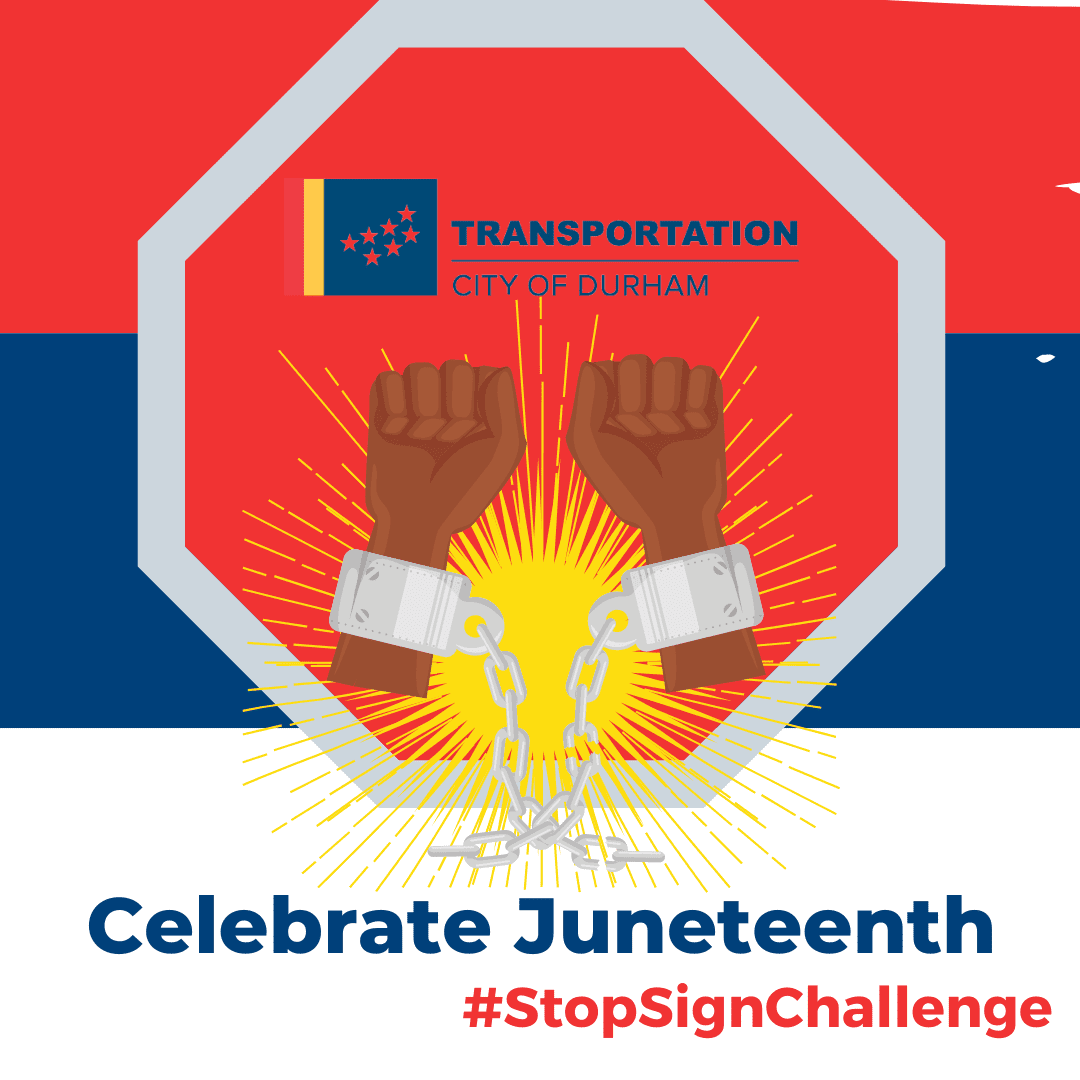On June 19, we celebrate Juneteenth, the day in 1865 when Major General Gordon Granger informed enslaved people in Texas about the conclusion of the Civil War and the abolishment of slavery. Each year on Juneteenth, our department pauses and reflects on our nation’s history through our #StopSignChallenge. The challenge represents an additional opportunity to continue our department’s efforts to incorporate equity across all projects, programs, and initiatives to keep mobility a service for all. The Reimagining Durham Freeway Study best represents the spirit of the #StopSignChallenge because it will shares our history, promote healing, and generate action through social change and mobility.
Reflecting on Our History:
Fifty-four years ago, the first cars drove down NC 147 through Durham, but this land was not always home to a highway. Previously, it represented prominent neighborhoods of the Hayti and Brookstown communities, thriving businesses, and religious institutions owned and operated by the African American population in Durham. The development of the highway, funded by the Federal Government’s Highway Act of 1956, demolished urban and poor Black communities with the promise to rebuild and restore using the Housing and Urban Development’s idea of “urban renewal” through the Housing Act of 1949.
Broken Promises:
Urban renewal labeled inner city and historically Black communities as “decaying neighborhoods,” negating their history and economic impact. The concept was marketed to community leaders, residents, and business owners as a chance to rebuild what was already established and create a better place to work and live. However, the promises of revitalized communities were never fulfilled once the residents were forced off their properties, surrendering their land to make what we know as the Durham Freeway.
Measuring the Impact:
The history of the destruction of affluent Black neighborhoods and communities does not only exist in Durham; it is nationwide and has continued for decades. NC 147 uprooted 4,000 families and 500 businesses, and caused, over $300 million worth of destruction to the Hayti community. By the late 1960s, an estimated 713 families had been displaced by urban renewal projects in Durham, 74% of which were families of color. Between 1949 and 1973, 2,500 neighborhoods in 933 American cities were bulldozed, displacing one million people.
Creating Space to Reimagine the Durham Freeway:
The Reimagine Durham Freeway Study is Durham’s chance to perform what we do at a stop sign:, pause, reflect, and look ahead at what is to come. By acknowledging the destruction, internalizing the misleading concepts of urban renewal, and embodying the hurt afflicted on the lives and livelihoods of Durham residents and descendants, our City and department can move forward to create Pathways to Connection.
Our department is currently leading the Reimagining Durham Freeway Study, using a community-led vision to drive the conversation about ideas for what the City can do with the open space along the Durham Freeway. Share your voice and contribute your ideas in the survey here. This project began in early 2024 and will continue into Summer 2025.
Get Involved:
Public engagement and outreach events are scheduled for the summer, and registration can be found here. A key event the consultant team promotes is the Hayti Heritage Walking Tour. Tours are led by Ayu Shabu, founder of Whistle Stop Tours. During the tour, participants will learn the legacy of Hayti’s significance as a sanctuary for African Americans seeking freedom and empowerment. The last tour for the summer months will take place on Saturday, June 1.
Every year, we acknowledge Juneteenth as more than a celebration because it is a moment of truth. Use the #StopSignChallenge to help you Celebrate, Educate, and Advocate for the continued push for racial equity by sharing the history and our chance to improve it through the Reimagining Durham Freeway Study. Celebrate how far society has come. Educate yourself on the effects of history. Advocate to create space for greater healing so we can develop more Pathways to Connection.
Sources and Additional Resources:
Defining Urban Renewal and its Impact on Other Cities

